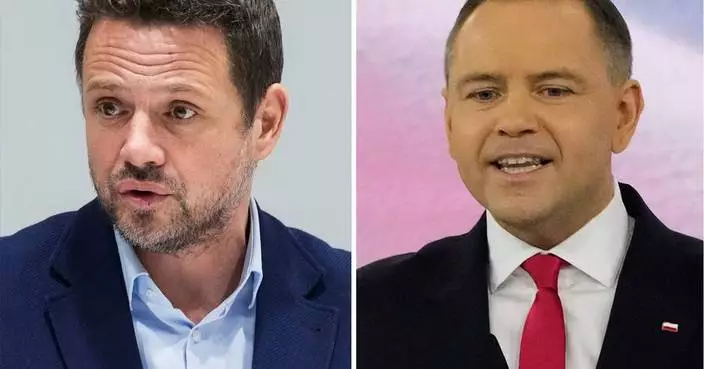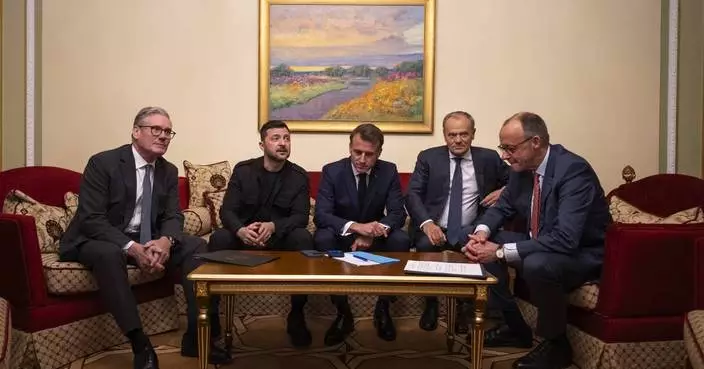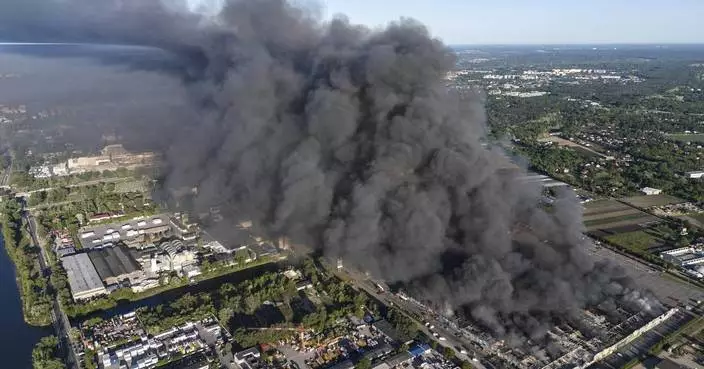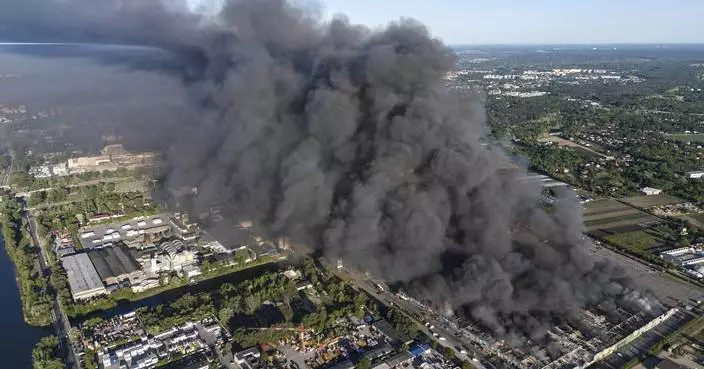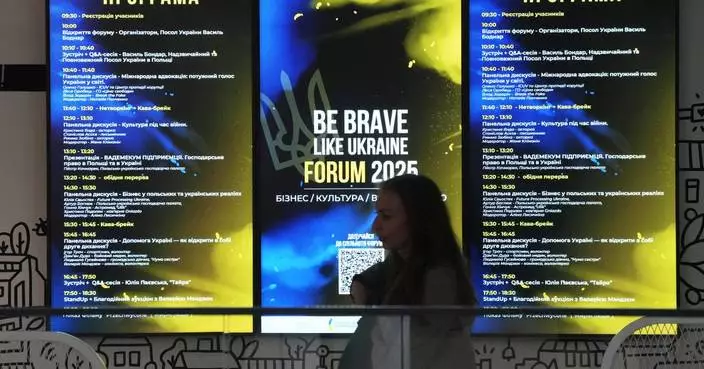The German government said Friday that the question of paying reparations to Poland for World War II has been resolved for over 60 years and there's no reason to reopen it.
Poland's government said recently that Germany has a moral obligation to pay for the massive destruction of many towns and a large part of the country's industry by the Nazi war machine.
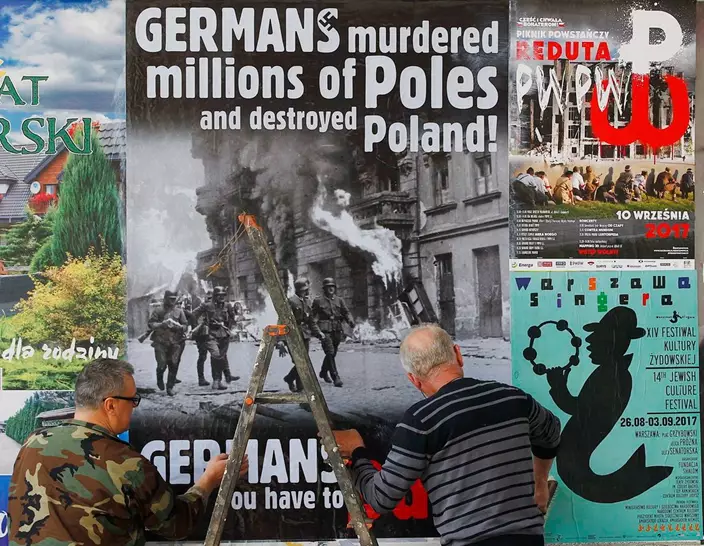
In this Aug. 24, 2017 photo a workers puts up a poster in Warsaw, Poland, calling on Germany to pay reparations for World War II to Poland. Poland's government is calling on Germany to pay it reparations for World War II, when more than five years of brutal Nazi occupation killed nearly a fifth of the population and wiped out industry and cultural wealth. But Germany says the matter was settled long ago and experts say there is no legal basis for Poland to demand reparations. That leaves government critics saying the real aim must be to create an external enemy as Poland's ties with Western Europe sour.(AP Photo/Czarek Sokolowski)
Chancellor Angela Merkel's spokesman told reporters that while Germany "stands by its responsibility for WWII" it has already paid reparations to Poland.
Steffen Seibert said Germany also considers Poland's relinquishment of further reparations in 1953, 1970 and 2004 to be legally binding.
Seibert said that "in our view this question has been completely resolved legally and politically."
He added that Germany is grateful for its current good relations with Poland.
In Poland, the government's plan to seek reparations met with opposition from the influential Catholic Church, whose leaders said that "ill-considered decisions and rash words" can easily destroy the "great value" that is the hard-won reconciliation between Poland and Germany.
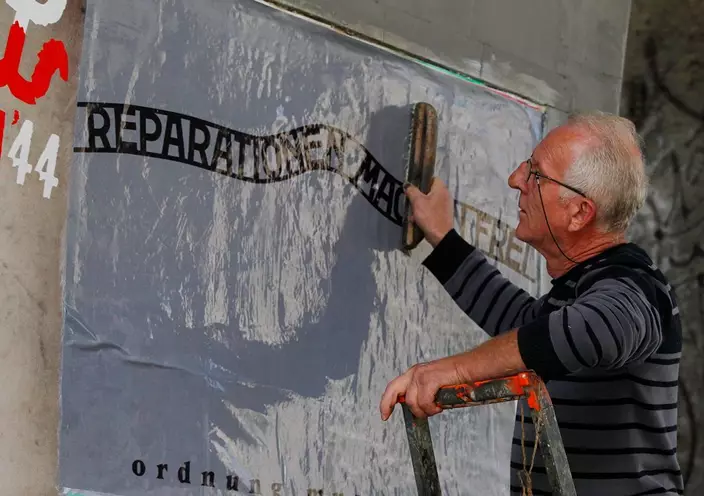
In this Aug. 24, 2017 photo a worker puts up a poster in Warsaw, Poland, calling on Germany to pay reparations for World War II to Poland. Poland's government is calling on Germany to pay it reparations for World War II, when more than five years of brutal Nazi occupation killed nearly a fifth of the population and wiped out industry and cultural wealth. But Germany says the matter was settled long ago and experts say there is no legal basis for Poland to demand reparations. That leaves government critics saying the real aim must be to create an external enemy as Poland's ties with Western Europe sour.(AP Photo/Czarek Sokolowski)
In a letter addressed to "persons responsible for our country and for international relations," five leading bishops said that the issues that have not been settled between the two nations should be approached through "wise diplomacy" that can help avoid negative emotions.
Poland's church is considered to be a powerful ally of the conservative ruling party and the words were seen as a friendly check on its policies.
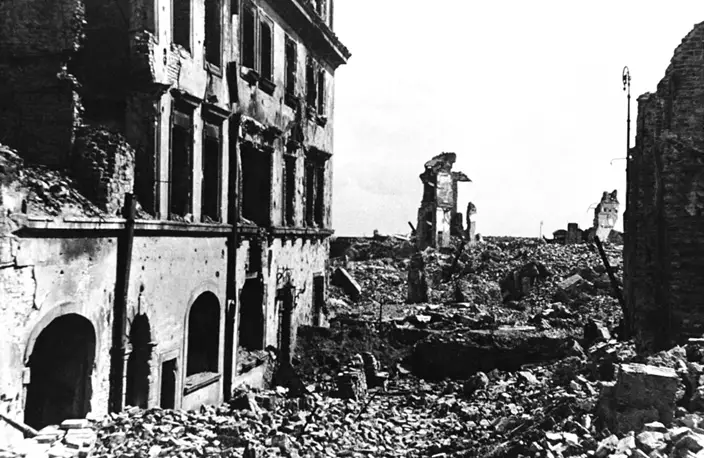
File-This Sept. 27, 1945, b/w file photo shows the shattered shell of the American Consulate building in devastated Warsaw, Poland, after World War II. Poland's government is calling on Germany to pay it reparations for World War II, when more than five years of brutal Nazi occupation killed nearly a fifth of the population and wiped out industry and cultural wealth. But Germany says the matter was settled long ago and experts say there is no legal basis for Poland to demand reparations. That leaves government critics saying the real aim must be to create an external enemy as Poland's ties with Western Europe sour. (AP Photo/Bille Allen,file)
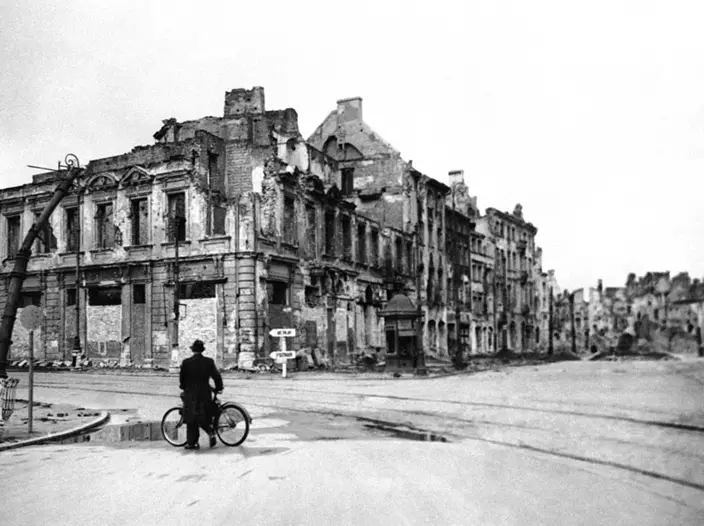
File-In this Oct. 1, 1945 file photo, a solitary cyclist contemplates a panorama of total destruction in Warsaw, the capital of Poland, months after World War II. Poland's government is calling on Germany to pay it reparations for World War II, when more than five years of brutal Nazi occupation killed nearly a fifth of the population and wiped out industry and cultural wealth. But Germany says the matter was settled long ago and experts say there is no legal basis for Poland to demand reparations. That leaves government critics saying the real aim must be to create an external enemy as Poland's ties with Western Europe sour. (AP Photo,file)
WARSAW, Poland (AP) — A war next door in Ukraine.Migration pressure at borders. Russian sabotage across the region. Doubts about the U.S. commitment to Europe's security.
In Poland’s presidential election Sunday, security looms large. So do questions about the country’s strength as a democracy and its place in the European Union. One of the new president’s most important tasks will be maintaining strong ties with the United States, widely seen as essential to the survival of a country in an increasingly volatile neighborhood.
Voters in this Central European nation of 38 million people will cast ballots to replace conservative incumbent Andrzej Duda, whose second and final five-year term ends in August.
With 13 candidates, a decisive first-round victory is unlikely. Some have appeared unserious or extreme, with a couple expressing openly pro-Putin or antisemitic views. A televised debate this week dragged on for nearly four hours. There are calls to raise the threshold to qualify for the race.
A runoff on June 1 is widely expected, with polls pointing to a likely showdown between Rafał Trzaskowski, the liberal mayor of Warsaw, and Karol Nawrocki, a conservative historian backed by the Law and Justice party, which governed Poland from 2015 to 2023.
Poland’s geography gives the election added importance. Bordering Russia’s Kaliningrad exclave, Belarus and war-torn Ukraine — as well as several Western allies — Poland occupies a critical position along NATO’s eastern flank and serves as a key logistics hub for military aid to Ukraine.
There are growing fears that if Russia prevails in its full-scale invasion of Ukraine, it could target other countries that freed themselves from Moscow's control some 35 years ago. Against that backdrop, the election will shape Warsaw’s foreign policy at a moment of mounting strain on trans-Atlantic unity and European defense.
Both leading candidates support continued U.S. military engagement in Europe. Trzaskowski puts greater emphasis on deepening ties with the European Union, while Nawrocki is more skeptical of Brussels and promotes a nationalist agenda.
When Law and Justice held power, it repeatedly clashed with EU institutions over judicial independence, media freedom and migration.
While Poland is a parliamentary democracy, the presidency wields significant influence. The president serves as commander-in-chief of the armed forces, holds veto power, shapes foreign policy and plays a symbolic role in national discourse.
Under Duda, the office largely advanced the conservative agenda of Law and Justice. Since Prime Minister Donald Tusk’s centrist coalition came to power in late 2023, Duda has blocked key reforms aimed at restoring judicial independence and repairing relations with the EU.
“The stakes are enormous for the ruling coalition and for those concerned with the future of Polish democracy,” said Jacek Kucharczyk, president of the Institute of Public Affairs, a Warsaw think tank. “This is about democratic reform and restoring the rule of law — and that can only happen with cooperation from the next president.”
The election is also pivotal for Law and Justice, Kucharczyk noted: “Its future as a dominant political force may hinge on the outcome.”
Both Trzaskowski and Nawrocki have pledged to support Ukraine and maintain strong defense ties, but their visions for Poland diverge sharply on the role of the EU and domestic social policy.
Trzaskowski, 52, is a former presidential contender and a senior figure in Civic Platform, the centrist party led by Tusk. He is running on a pro-European platform and has pledged to defend judicial independence and rebuild democratic institutions.
Supporters describe him as a modernizer who represents a cosmopolitan, outward-facing Poland. He speaks foreign languages, has marched in LGBTQ+ parades and appeals to younger, urban voters. Trzaskowski's progressive views highlight an evolution of the once more conservative Civic Platform.
Nawrocki, 42, represents how the party backing him, Law and Justice, is turning further to the right as support for the hard right grows.
Nawrocki, who is not a Law and Justice party member, heads the state-backed Institute of National Remembrance, which investigates Nazi and communist-era crimes. He has drawn praise from conservatives for dismantling Soviet monuments and promoting patriotic education, but he faces criticism for inexperience and playing on anti-German and other resentments. He has also been embroiled in some scandals.
Earlier this month, Nawrocki met with U.S. President Donald Trump at the White House — a symbolic moment welcomed by Law and Justice-friendly media as proof that he would be the best man for keeping the relationship with the United States strong. Critics viewed it as interference by Trump's administration.
This week Nawrocki was joined on the campaign trail by Romanian nationalist George Simion, who faces a runoff vote for the presidency on Sunday. Simion is viewed by critics as pro-Russian, leading Tusk to tweet: "Russia is pleased. Nawrocki and his pro-Russian Romanian counterpart George Simion on the same stage five days before the presidential elections in Poland and Romania. Everything is clear.“
AP video reporter Rafał Niedzielski contributed to this report.
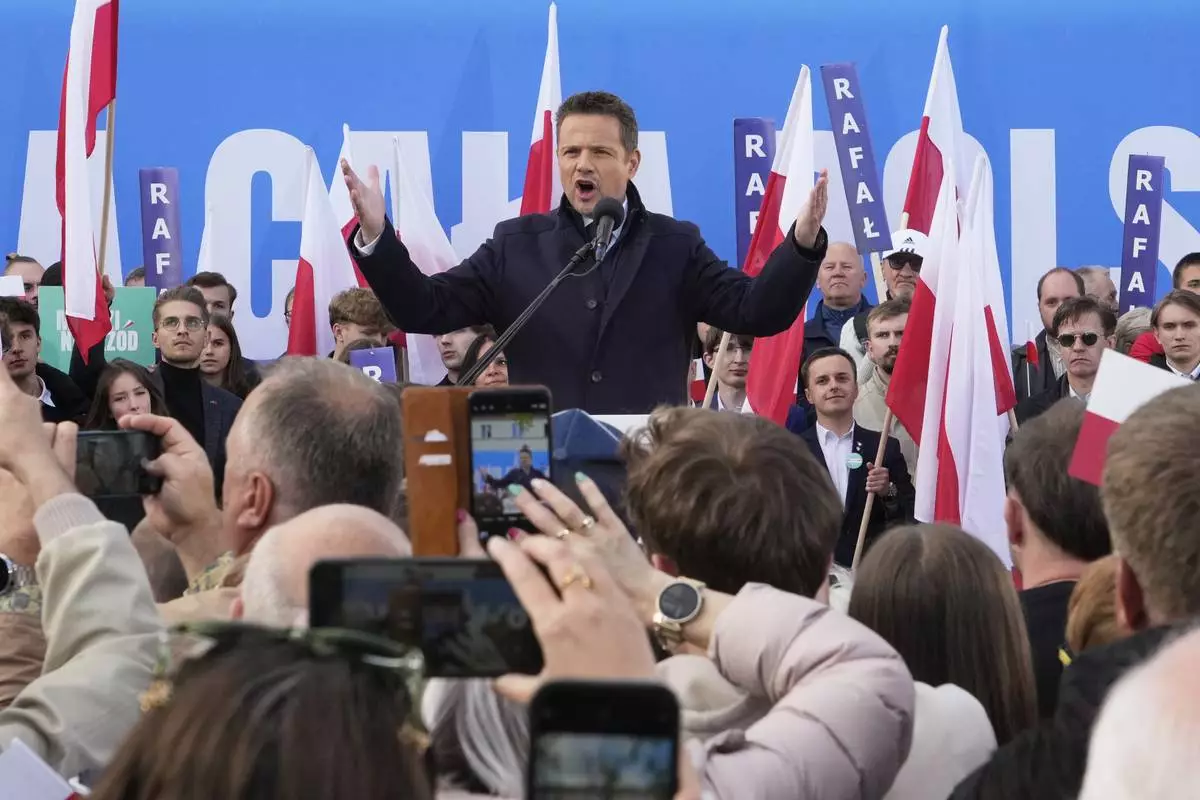
Warsaw Mayor Rafał Trzaskowski, a liberal candidate in Poland's presidential election, speaks to supporters during a campaign stop, in Lodz, Poland, Friday, May 9, 2025. (AP Photo/Czarek Sokolowski)
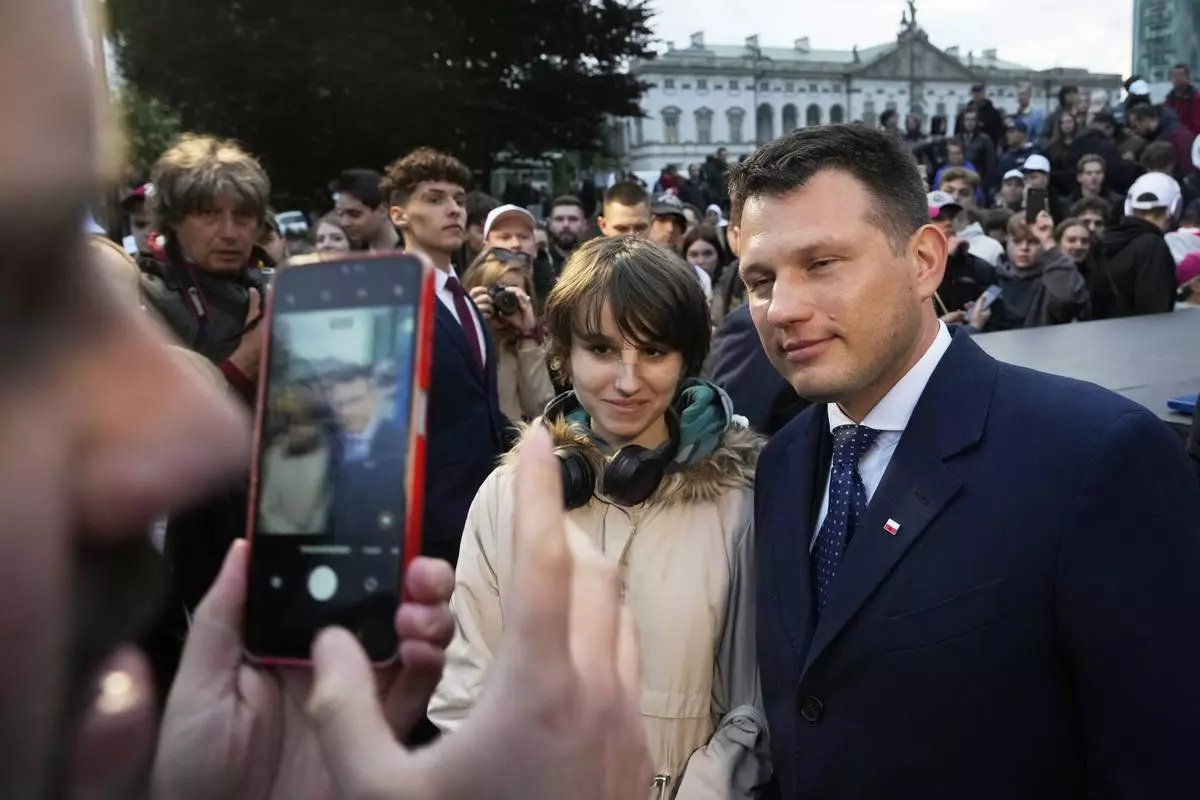
Far-right Confederation party's presidential candidate Sławomir Mentzen poses for a photo with supporters in Saturday,Warsaw, Poland, May 10, 2025. (AP Photo/Czarek Sokolowski)
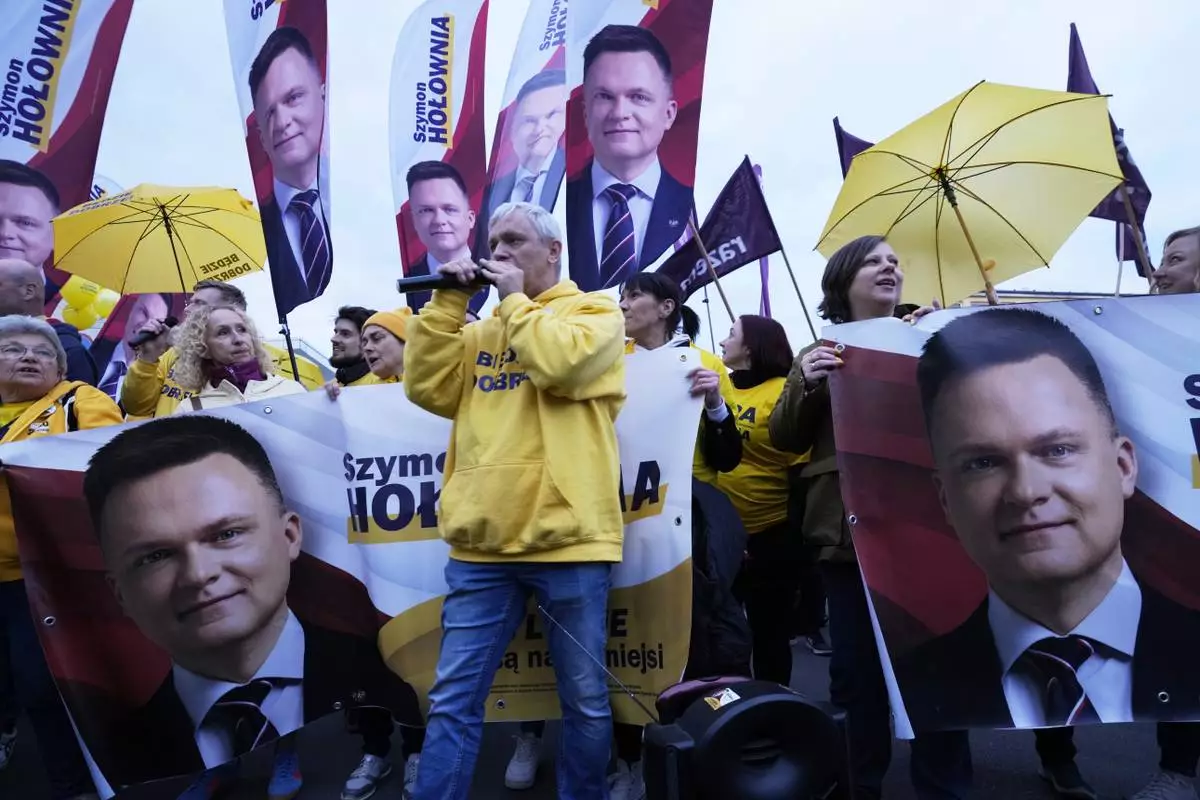
Supporters join a campaign rally in support of presidential candidate Szymon Hołownia in Warsaw, Poland ,Tuesday, May 13, 2025. (AP Photo/Czarek Sokolowski)
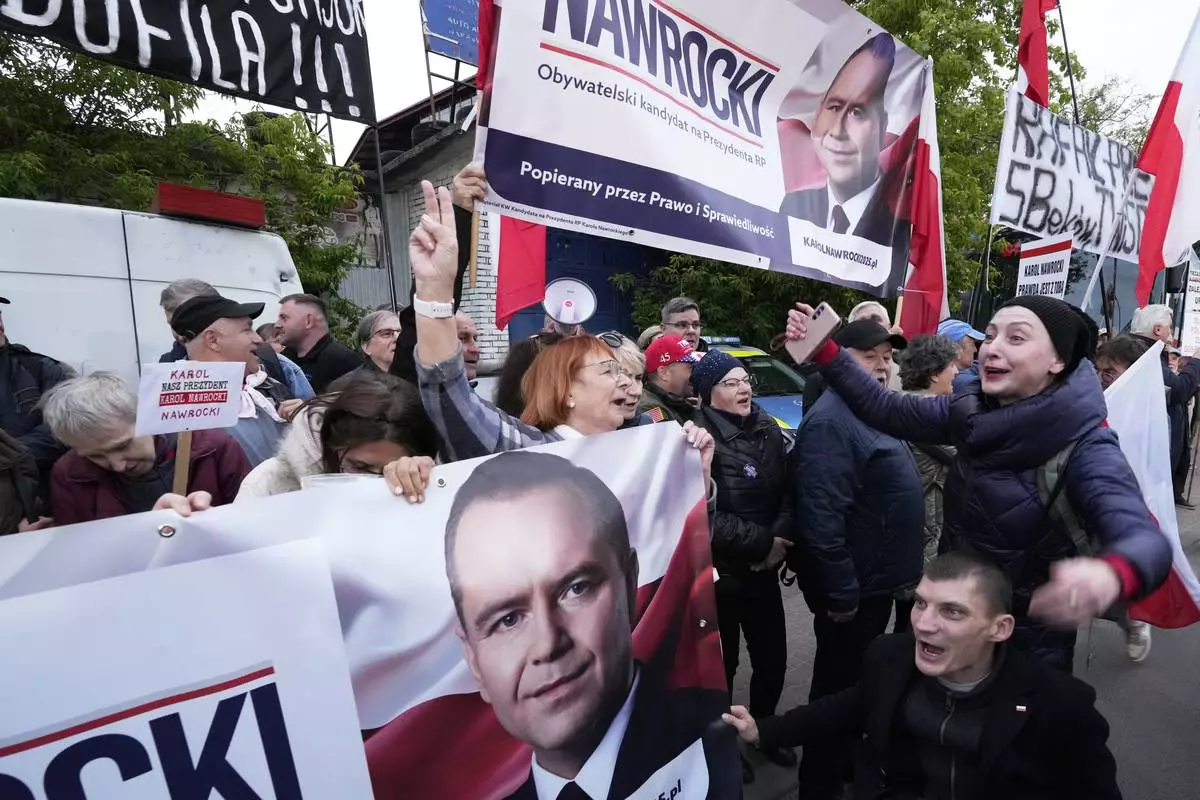
People carry placards in support of conservative presidential candidate Karol Nawrocki in Warsaw, Poland, Tuesday, May 13, 2025. (AP Photo/Czarek Sokolowski)
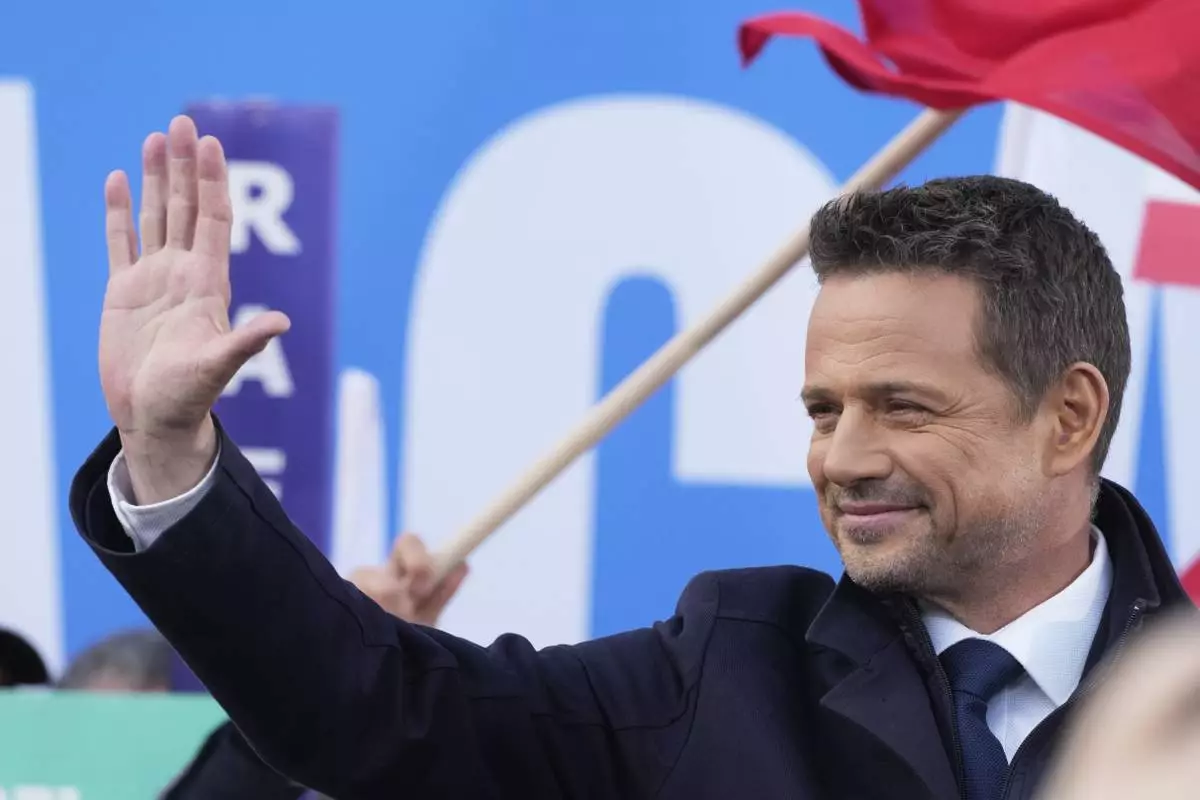
Warsaw Mayor Rafał Trzaskowski, a liberal candidate in Poland's presidential election, waves to supporters during a campaign stop, in Lodz, Poland, Friday, May 9, 2025. (AP Photo/Czarek Sokolowski)












